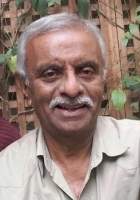- Equity, inclusion and sanitation workers
- Inclusive programming and other topics under equity and inclusion
- How can we improve Women enrolment and interest in WASH education opportunities?
How can we improve Women enrolment and interest in WASH education opportunities?
6489 views
- Hariprasad
-
 Less
Less- Posts: 7
- Likes received: 11
Re: How can we improve Women enrollment and interest in WASH education opportunities?
Like Chaiwe mentioned the example of fresh graduates of Zambia, going up the ladder is still an issue if you are not associated with a reputed organization. In this instance, rather than opening up the job opportunities and giving priority in job applications, once they are selected, the female employees should be given some extra support/bonus to overcome the social and economic challenges. This needs a detailed understanding of the existing women employees in the sector and needs to be analysed at HR (Human resource) Manager level and also at academic levels. This means, what can be a good support for the female candidate to pursue their academic and career interests by overcoming the social and economic challenges.
Regards,
Hariprasad
Research Scholar
CTARA, IIT Bombay
Please Log in to join the conversation.
You need to login to reply- Chaiwe
-
 Topic Author
Topic Author- Moderator
- Innovation enthusiast and Knowledge Management Expert in WASH and Climate Change while cross-cutting Youth and Gender Issues. CEO of CaDev_Capacity Development (An African Social Enterprise)
Less- Posts: 336
- Karma: 8
- Likes received: 116
Re: How can we improve Women enrolment and interest in WASH education opportunities?
I am glad this topic has been brought back to thetop of the discussion thread. It is one that needs quite some attention if we should ultimately see more Women participation and representation in the sector at all levels.
One thing that I have been focussing on lately inmy work is to get answers to the question ''What is the sector doing to offer Women (especially in the global south) career or professional opportunities once they have attained qualifications in the WASH sector?'' There is a notable relationship between Women's interests in enrolling in WASH sector education and the opportunities that exist for them after they qualify.
I recently met with some fresh graduates from some tertiary programmes on plumbing, water engineering and water operation here in Zambia. The biggest question they wanted answered was ''what next!?'' In the case of Zambia, formal jobs in the WASH field are scarce and very few organisations and institutions are hiring, while also demanding extensive experience averaging 2-5years as a prerequisite
for hiring. With the additional bias that many WASH professions are male-dominated and also bearing in mind that most graduates and professionals in this field are men. The young ladies and others who may want to follow similar career paths express that they end up quite disadvantaged and demotivated to continue on these career paths.
To cushion the challenge of limited opportunities for Women, I have been exploring Women-led business opportunities, business training and entrepreneurship support opportunities that help women in WASH unlock their own opportunities within the sector amidst the scarcity of Job opportunities. It would be great to learn whether this is being done elsewhere and what successes have been scored.
Kind Regards,
Chaiwe
Skat Foundation (With financial support by GIZ and SIRWASH up to November 2023)
Chaiwe Mushauko-Sanderse BSc. NRM, MPH
Independent consultant located in Lusaka, Zambia
Emails: This email address is being protected from spambots. You need JavaScript enabled to view it., This email address is being protected from spambots. You need JavaScript enabled to view it.
LinkedIn: www.linkedin.com/in/chaiwe-mushauko-sanderse-21709129/
Twitter: @ChaiweSanderse
Please Log in to join the conversation.
You need to login to reply- AjitSeshadri
-

- Marine Chief Engineer by profession (1971- present) and at present Faculty in Marine Engg. Deptt. Vels University, Chennai, India. Also proficient in giving Environmental solutions , Designation- Prof. Ajit Seshadri, Head- Environment, The Vigyan Vijay Foundation, NGO, New Delhi, INDIA , Consultant located at present at Chennai, India
Re: How can we improve Women enrolment and interest in WASH education opportunities?
I am endorsing the views expressed., further in order women get learned and become aware of all the basic
Principles and practices, the awareness programs need to be imparted at school levels itself.
Both theoretical and practical sessions are ďone to make all youth both girls and boys aware and participative in day to day activities Etc.
Well wishes
Prof Ajit Seshadri
The Vigyan Vijay Foundation Ngo, New Delhi.
Head-Environment , VigyanVijay Foundation, Consultant (Water shed Mngmnt, WWT, WASH, others)Located at present at Chennai, India
Please Log in to join the conversation.
You need to login to reply- Namukonda
-
 Less
Less- Posts: 2
- Likes received: 3
Re: How can we improve Women enrolment and interest in WASH education opportunities?
Thank you so much for recognizing me and for advocating for the women in general, personally am so humbled and on my knees saying thank you so much. continue advocating for women, for once you educate a woman you educate the entire nation/world. women are so much important in the sanitation sector though, most of the times they are left out because traditionally, women and girls are regarded to be a gender that should always be at home to do house chores such as caring for a home, children and elderly or sick relatives. Hence, women and girls are stewards of household water and managers of household sanitation. women and girls manage their reproductive and menstrual health needs in which all this is pointing to Sanitation. Therefore, for effective and sustainable Sanitation, it is important to involve women in Sanitation and promote them by fully supporting them in so many areas such as giving scholarships in Sanitation programs up to even PHD levels.
kind regards,
Joyce N. Siame
Please Log in to join the conversation.
You need to login to reply- Mofwe
-
Less
- Posts: 1
- Likes received: 2
Re: How can we improve Women enrolment and interest in WASH education opportunities?
Concerning the MSc in Sanitation at the University of Zambia, I am teaching on the programme and we now have our third cohort. For this year's cohort, we have more women enrolled (9) compared to men (7), which is very encouraging in terms of WASH education opportunities for women. The programme is running online with evening sessions, thus we have students from beyond the capital Lusaka; offering students the flexibility of work and school.
Regards,
Mofwe
Please Log in to join the conversation.
You need to login to reply- Chaiwe
-
 Topic Author
Topic Author- Moderator
- Innovation enthusiast and Knowledge Management Expert in WASH and Climate Change while cross-cutting Youth and Gender Issues. CEO of CaDev_Capacity Development (An African Social Enterprise)
Less- Posts: 336
- Karma: 8
- Likes received: 116
Re: How can we improve Women enrolment and interest in WASH education opportunities?
The University of Zambia (UNZA) recently introduced a Masters in Sanitation programme that saw the enrolment of a little over 20 students in the programme (mostly male). Generally in Zambia, master's level programmes and beyond receive the most enrolments from working professionals looking to improve their qualifications, despite facing time constraints and the pressure of demanding jobs. The second year of the programme offers some flexibility on execution time, as students embark on their thesis research which can often take months to complete depending on the intensity and nature of the research subject. The successful completion of one's thesis sees them graduating with the first cohort of graduates across various disciplines or otherwise they join the second cohort months later. This year despite the challenges of a full-time job and a family to support, the first-ever graduate from the newly introduced Masters in Sanitation Programme to graduate within the first Cohort was Joyce Siame (a female student).
Joyce, an Environmental Health Technician with over 9 years of work experience in the field of environmental health (including teaching environmental health-related courses at a tertiary level) gives a short account of her journey to becoming the first and only graduate (currently) in this Masters in Sanitation Programme at UNZA.
What made me pursue a master’s degree in sanitation?
As an Environmental health personnel working in a rural setting of Zambia, my work mostly involves conducting assessments, controlling and prevention of adverse situations that affect the environment and may negatively affect the health status of the general public. In order to achieve this, I consider the aspect of sanitation to be key. I consider SANITATION to be key in effectively achieving the goals of environmental health. I was excited when I saw the advert on social media (WhatsApp) that the University of Zambia had introduced a Sanitation program at post graduate level. This is what made me apply for the Masters in Sanitation as a first cohort student.
My passion for my country Zambia is to ensure effectiveness in the prevention of transmissible Infections/diseases which can be prevented through practicing appropriate sanitation. Hence, my interest to carry out research for my Thesis on “determinants of hand hygiene behaviour during the covid-19 pandemic among traders at new Soweto Market in Lusaka District”. Note: SDGs cannot be achieved without Sanitation.
How did i emerge as the first graduate in this Masters in Sanitation programme?
Commitment and determination to completing academic tasks on time and ability to conduct research within the allocated time
It is always great to get an account of motivation from the Women themselves. This in turn inspires young people and fellow Women to take up related programmes. Congratulations Joyce!! We look forward to hearing about the impact you will certainly make within the Environmental Health space with your added knowledge and qualification in Sanitation.
Kind Regards,
Chaiwe
Skat Foundation (With financial support by GIZ and SIRWASH up to November 2023)
Chaiwe Mushauko-Sanderse BSc. NRM, MPH
Independent consultant located in Lusaka, Zambia
Emails: This email address is being protected from spambots. You need JavaScript enabled to view it., This email address is being protected from spambots. You need JavaScript enabled to view it.
LinkedIn: www.linkedin.com/in/chaiwe-mushauko-sanderse-21709129/
Twitter: @ChaiweSanderse
Attachments:
-
 WhatsAppIm...4PM.jpeg
(Filesize: 98KB)
WhatsAppIm...4PM.jpeg
(Filesize: 98KB)
Please Log in to join the conversation.
You need to login to replyRe: How can we improve Women enrollment and interest in WASH education opportunities?
Thanks for sharing the resources and launching the exchange about this topic on SuSanA. While searching for ideas and best practices on how to increase enrollment and completion rates of women in our MOOCs series "Sanitation, Water and Solid Waste for Development" (www.eawag.ch/mooc), my colleague Laura Baquedano has found the FOSTWOM website (fostwom.eu/) which aims at promoting full & equal access for girls and women in STEM. The website includes for example this useful gender-balance checklist for STEM MOOC creators tinyurl.com/yzek7utp .
Best regards,
Fabian
Digital learning manager
Sandec /Eawag
This email address is being protected from spambots. You need JavaScript enabled to view it.
Please Log in to join the conversation.
You need to login to reply- Chaiwe
-
 Topic Author
Topic Author- Moderator
- Innovation enthusiast and Knowledge Management Expert in WASH and Climate Change while cross-cutting Youth and Gender Issues. CEO of CaDev_Capacity Development (An African Social Enterprise)
Less- Posts: 336
- Karma: 8
- Likes received: 116
How can we improve Women enrollment and interest in WASH education opportunities?
The Water Supply and Sanitation Sector has continued to remain a male dominated sector. According to a 2020 World Bank report on Women in Water Utilities, only about one in five water employees and only 23% of licensed engineers are women and the same goes for female managers within utility companies . This trend is a challenge to the sector, and posses a great disadvantage to the sector in many ways, but especially in the area of inclusive sector programming. Cultural aspects have contributed to the way Women and Men view roles that are related to water and sanitation and how they participate.
There is need for the sector to work even harder at addressing the gender imbalance and encourage women participation at decision making and implementation levels. At household level, provision of hygiene and sanitation is often considered a Women's role (depending on your geographical location). Women are promoters, educators and drivers of household and community-based sanitation practices. In spite of this, the concerns of women are rarely addressed as societal barriers usually limit women’s involvement in decision making regarding toilets, sanitation programming and projects at higher level.
Research has indicated that, an important determinant of low female representation in the WSS sector and low representation of females in technical jobs is due to the low numbers of women attaining training in the WASH technical and vocational training and beyond. In order to encourage female enrollment and interest in WASH, there is need to increase the number of scholarships for women in Science, Technology, and Engineering and Mathematics (STEM) studies. Financial problems contribute to low female participation and high drop-out of students. The University of Zambia for example,(to mitigate this), is now sponsoring all its Masters in Sanitation female students through a donor grant in order to make this programme more attractive. Similar to Zambia, in Tanzania, a program by the World Bank aims to encourage the enrollment of female students at the Country’s Water Institute by allocating a larger percentage of sponsored student loans to women and girls: See Here
International exchange programs can also encourage female participation in WSS courses. International educational and cultural exchange program allow different people from around the world to experience the different and diverse educational systems, enhance their knowledge and skills, and explore other positive cultures and values.In Zambia , a newly established sector Skills Advisory Group (SAG) aims at bringing the water and sanitation employers, employees, and skills providers together to exchange knowledge on skills and labor market needs. Among some of the activities the SAG engages in to promote female participation includes giving awards to best performing females in Water Sanitation and Hygiene (WASH, Plumbing and Electrical courses: See Here
The newly established African Women Sanitation Professionals Network- Zambia Chapter (AWSPN-ZC) advocates for enhancement of WASH skills for Women, in collaboration with the Technical Vocational Training Authorities. During the 2021 Zambia Water Forum and Exhibition (ZAWAFE), the women’s network held a mentorship session for female students pursuing water related courses. Read More Here
Am curious to learn about what others are doing in the quest to improve the enrollment of women in WASH education and mentorship programs and arouse their interest in sector participation. Share your thoughts.
Regards,
Chaiwe
Skat Foundation (With financial support by GIZ and SIRWASH up to November 2023)
Chaiwe Mushauko-Sanderse BSc. NRM, MPH
Independent consultant located in Lusaka, Zambia
Emails: This email address is being protected from spambots. You need JavaScript enabled to view it., This email address is being protected from spambots. You need JavaScript enabled to view it.
LinkedIn: www.linkedin.com/in/chaiwe-mushauko-sanderse-21709129/
Twitter: @ChaiweSanderse
Please Log in to join the conversation.
You need to login to reply- Equity, inclusion and sanitation workers
- Inclusive programming and other topics under equity and inclusion
- How can we improve Women enrolment and interest in WASH education opportunities?







